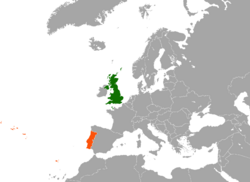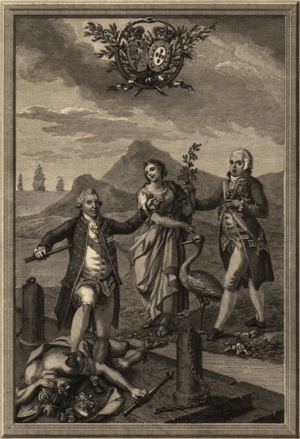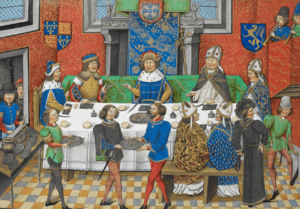Anglo-Portuguese Alliance facts for kids
 |
|
United Kingdom |
Portugal |
|---|---|
The Anglo-Portuguese Alliance (also known as Aliança Luso-Inglesa) is one of the oldest military alliances still active today. It began with the Treaty of Windsor in 1386. This agreement was made between the Kingdom of England (now the United Kingdom) and the Kingdom of Portugal (now the Portuguese Republic). However, the countries had already been allies since the Anglo-Portuguese Treaty of 1373.
Portugal and England (and later the UK) have never fought against each other. They have also never been on opposite sides in a war since the Treaty of Windsor was signed. Even when Portugal was part of the Iberian Union with Spain, rebellious Portuguese groups found safety and help in England. England even led a war against Spain (the Anglo-Spanish War (1585–1604)) to support the Portuguese royal family.
This alliance has helped both countries throughout their history. For example, it influenced the UK's role in the Peninsular War, a major part of the Napoleonic Wars. Portugal also helped England (and later the UK) when needed, like during the First World War. Today, both Portugal and the United Kingdom are members of NATO. NATO is a larger military alliance of many North American and European countries.
Contents
How the Alliance Began in the Middle Ages
English help to the House of Aviz (the ruling family in Portugal from 1385 to 1580) was very important. It set the stage for Portugal's cooperation with England. This became a key part of Portugal's foreign policy for over 500 years.
However, English help to Portugal started even earlier. In 1147, during the Siege of Lisbon, English crusaders helped the Portuguese King Afonso Henriques. They were on their way to the Holy Land for the Second Crusade. They stopped and helped Portugal conquer Lisbon from the Moors.
In May 1386, the Treaty of Windsor officially sealed the alliance. This friendship had started in 1294. It was renewed in the Treaty of Tagilde in 1372 and the Anglo-Portuguese Treaty of 1373. It was also confirmed at the Battle of Aljubarrota in 1385. The most important part of the treaty said:
It is cordially agreed that if, in time to come, one of the kings or his heir shall need the support of the other, or his help, and in order to get such assistance applies to his ally in lawful manner, the ally shall be bound to give aid and succour to the other, so far as he is able (without any deceit, fraud, or pretence) to the extent required by the danger to his ally’s realms, lands, domains, and subjects; and he shall be firmly bound by these present alliances to do this.
In July 1386, John of Gaunt, the Duke of Lancaster, came to Galicia. He was the son of King Edward III of England. He brought an army to claim the throne of Castile with Portuguese help. But he did not get the support of the Castilian nobles. He returned to England after getting money from the other claimant.
John of Gaunt left his daughter, Philippa of Lancaster, in Portugal. She married King John I of Portugal in February 1387. This marriage helped to strengthen the Anglo-Portuguese alliance. Through this marriage, John I became the father of a special group of princes. The poet Luís de Camões called them the "Illustrious Generation." They led Portugal into its golden age during the Age of Discoveries.
Philippa brought English traditions to the Portuguese court. She made sure her children received good educations. She was known for her high moral standards. She reformed the court and set strict rules for behavior. Some Portuguese nobles found her methods a bit old-fashioned.
Philippa supported English businesses. These businesses wanted to trade cod and cloth with Portugal. In return, Portugal offered wine, cork, salt, and oil. These goods were shipped through English warehouses in Porto.
Her eldest son, Duarte, became king in 1433. He wrote books about morals. Pedro, who traveled widely, became regent from 1439 to 1448. This happened after Duarte died from the plague in 1438. Ferdinand the Saint Prince (1402–1443) became a crusader. He took part in an attack on Tangiers in 1437. And Prince Henry the Navigator (1394–1460) became the head of the Order of Christ. He was the main organizer of Portugal's early voyages of discovery.
Challenges and Renewals of the Alliance
The Iberian Union (1580–1640) was a time when Portugal and Spain were united under one ruler. This 60-year period interrupted the alliance between Portugal and England. During this time, Elizabeth I of England fought against Philip II of Spain. This meant Portugal and England were on opposite sides in the Anglo-Spanish War (1585–1604). Portugal's foreign policy became linked to Spain's dislike of England. England even captured the Portuguese base of Ormuz in Persia in 1622.
However, in 1640, England supported the Portuguese House of Braganza. This family took power in Portugal, replacing the House of Habsburg. This ended the 60-year union between Portugal and Spain. England's support for Portugal during their Restoration War showed the alliance was back.
The alliance became even stronger after the English Restoration. This was when Catherine of Braganza married Charles II of England. Portugal gave Tangier and Bombay to England as part of her dowry. England also promised military help. They would protect Portuguese ships in the Mediterranean and near Lisbon and Porto.
After Spain lost the war, England helped create the Treaty of Lisbon in 1668. This treaty recognized Portugal's independence. It also recognized Pedro II as King. The English alliance was key to Portugal becoming truly independent. In return, Portugal promised to give England most of the places recovered from the Dutch. They also agreed to share cinnamon trade and allow English families to settle in Portuguese colonies with the same rights as Portuguese families.
The Alliance from the 17th to 19th Centuries

The alliance was confirmed again after the Iberian Union ended. This was mainly because both countries had rivalries with Spain, the Netherlands, and France. These rivalries were both in Europe and overseas. During this time, some important events for the alliance included:
- The War of the Spanish Succession (1701–1714): Portugal first sided with France. But after the Battle of Blenheim, it rejoined its ally, England.
- The Seven Years' War (1756–1763): Spain invaded Portugal in 1762. Britain stepped in as Portugal's ally. Even though they faced many more enemies, Portuguese and British forces defeated the Spanish and French. The invaders suffered huge losses.
- The Napoleonic Wars (1803–1815): Portugal was surrounded by countries controlled by Napoleon. But Portugal kept trading with the United Kingdom despite French rules. Portugal was finally invaded. But with British help, Portugal regained its full independence. The Portuguese royal family, including Prince John, moved to Brazil. They were escorted by the British fleet.
- The Portuguese Civil War (1828–1834): The United Kingdom gave important support to the Liberal side.
- The 1890 British Ultimatum: The British government told Portugal to leave the area of modern-day Botswana. They also told Portugal not to expand its colony of Portuguese East Africa. This was because a Portuguese explorer, Serpa Pinto, had explored the region. This ultimatum is seen as a main reason for the Republican Revolution. This revolution ended the monarchy in Portugal 20 years later.
The Alliance in the 20th Century
The treaty was used several times during the 20th century.
First World War
After German attacks in Portuguese East Africa (now Mozambique), Portuguese troops fought. They joined Allied soldiers on the Western Front during the First World War.
Second World War
When war was declared in September 1939, Portugal announced the alliance was still active. However, Britain did not ask for Portugal's help, so Portugal stayed neutral. Britain thought Portugal's neutrality was "essential" to keep Spain from joining the war with Germany.
In May 1940, António de Oliveira Salazar, Portugal's prime minister, was recognized by Britain. The University of Oxford offered him an honorary degree.
In July 1940, Salazar's choice to stick with the alliance helped the Allies. About 2,500 people evacuated from Gibraltar were sent to the Portuguese island of Madeira.
In September 1940, Winston Churchill praised Salazar. He congratulated him for keeping Portugal out of the war. Churchill said that British and Portuguese interests were the same on this important issue.
Samuel Hoare, 1st Viscount Templewood, the British Ambassador in Madrid, recognized Salazar's key role. He said Salazar was crucial in keeping Spain and Portugal neutral during the war. Lord Templewood believed Salazar was dedicated to his country. He thought Salazar believed any step away from neutrality would harm Portugal. He also said Salazar "detested Hitler" and that the Portuguese government was very different from Nazism.
During the Second World War, Salazar kept Portugal neutral but still helped the Allies. The British Ambassador in Lisbon, Ronald Campbell, saw Salazar as loyal to the alliance. In August 1943, Britain asked for base facilities in the Azores. They reminded Portugal of their 600-year alliance. Salazar agreed quickly. Portugal allowed Britain to use naval bases in the Azores. These included Horta and Ponta Delgada. They also allowed use of airfields like Lajes Field and Santana Field.
From November 1943 to June 1945, many U.S. aircraft used the Lajes base in the Azores. This included bomber planes that flew across the Atlantic. Cargo planes carried important people and equipment to North Africa and the UK. Flights returning from Europe carried wounded soldiers. Using Lajes Field cut flying time between the U.S. and North Africa from 70 hours to 40. This showed how valuable the Azores were during the war.
After the War
Portugal and the United Kingdom were among the first members of NATO in 1949.
The European Free Trade Association (EFTA) was formed in 1960. Portugal and the UK were two of its seven founding members. In 1973, the UK left EFTA to join the European Economic Community (EEC). Portugal did the same in 1986.
During the 1982 Falklands War, Portugal again offered the Azores facilities to the Royal Navy.
The Alliance in the 21st Century
On June 13, 2022, the Prime Ministers of Portugal and the United Kingdom signed a new agreement. This was called the UK-Portugal Joint Declaration on Bilateral Cooperation. It strengthened the Anglo-Portuguese Alliance. It also confirmed its status as the longest-running alliance still active. This declaration also celebrated the 650th anniversary of the Treaty of Tagilde.
Both nations officially celebrated the 650th anniversary of the Anglo-Portuguese Treaty of 1373 on June 16, 2023. The British government stated they plan to sign a "new bilateral Defence Agreement" later in the year. This agreement will take their defense cooperation to a higher level.
Both countries continue to be members of the larger military alliance, NATO.
See also
- Portugal–United Kingdom relations
- Anglo-Portuguese Treaty of 1878
- Dutch–Portuguese War
- Anglo-Dutch Wars
Images for kids
-
Allegory of George III of the United Kingdom and John VI of Portugal, by Joaquim Carneiro da Silva (1810). It is accompanied by a poem:
"Immortal trophies George's throne surround:
Here Envy crush'd, and there Ambition bound
Braganza's line by Gratitude combin'd
Clears fast to Brunswick's ever closely twin'd."
 | Lonnie Johnson |
 | Granville Woods |
 | Lewis Howard Latimer |
 | James West |



